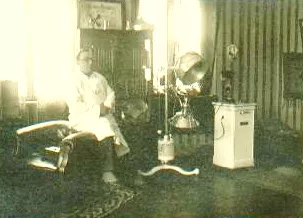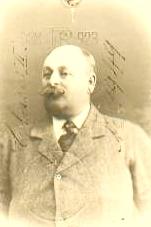This photo was taken in my father’s medical practice in Braila. My father, Noe Gatlan, had ultraviolet and infrared devices, but they don't show here. He had a very nice office, with leather armchairs. They remained in the attic of the house on Galati Street. My father had that practice from the day he moved to Braila.
My father studied in Italy. His family sent him to medical school there - he studied surgery in Turin between 1924 and 1929. So he was a medical school graduate. He didn't become a surgeon; he was specialized in skin and venereal diseases. Even the post on the practice our family used to have said that. I don't know if my father did his military service, but I know he worked as an army physician in Braila. I don't know for how long he did that, because I don't have any papers. Had I had such papers, I might have got some aids, because I know they sent some from Germany. So he worked as a physician in the Romanian army for a while.
My father's clientele was multi-ethnic. During World War II, he was very busy, especially after the Russians occupied us. As he was a gynecologist - he mostly practiced gynecology and had a gynecological table - Russians used to come to him to treat their gonorrhea. So many of my father's clients were Russian officers - they asked one another where they had their condition treated, and this is how my father's name came up.
There was also that dreadful period when Jews were sent to sweep the streets. But my father kept his practice for a while. He wasn't deported to Transnistria, like others were, but he did get sent to forced labor here, locally, in 1942 or 1943. They took white-collar and blue-collar Jews out in the street and made them do chores. Jews had a really hard time in Bukovina and Transylvania. Those in the Regat [Kingdom] weren't forced to do hard labors. They were sent to sweep the streets. But they knew that Jews from other regions were being sent to Auschwitz or to Transnistria, so, of course, they were afraid not to end up there themselves.
































